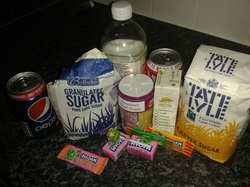
If you have been listening to the news this week, you would have heard that the government could be forced to bring in a tax on sugar in the UK to help combat growing levels of obesity So today's blog focuses on some sugar related FAQ's.
Where does sugar come from?
Well, sugar actually comes from the sugar cane plant and white sugar is basically the crystallized version of the juice that has been extracted from the plant. In itself, sugar is not the enemy, as it is a carbohydrate naturally occurring in most foods that we eat and our bodies need a certain amount to give us energy. The problem is the amount of sugar that we consume!!
How much is enough?
The recommended daily allowance of sugar for men is 70g and 50g for women. Keeping a diary and reading nutritional labels on food is a great way to monitor if you are on track. I know it can be such a pain, especially when the print is so small!! Remember;
-More than 22.5g of carbohydrates (of which are sugars) per 100g is TOO MUCH
-5g of carbohydrates (of which are sugars) per 100g is OK
There are a range of FREE apps you can download on your smartphone to help you monitor this. My Fitness Pal is a very popular one.
Which type of sugar is the best?
There is such an array of sugar available in supermarkets today, that it makes it so difficult to know which ones to choose. Sadly, the current pricing strategy doesn't help, as the better types of sugar often costs more! Ideally, you want to choose a sugar which has doesn't have such a negative effect on your blood sugar level. The Glycemic Index (GI) of your preferred sugar is a useful indicator, as the higher the number the higher the impact on our blood sugar levels. Ideally you want to opt or a low GI option like Stevia, Agave Syrup, or Fructose. As a guide......
Below 55 - low GI.
56 to 69 - medium GI.
Above 70 -high GI.
Check out the link below which gives a full list of sugars and sweeteners.
http://www.sugar-and-sweetener-guide.com/glycemic-index-for-sweeteners.html
Sugar and Weight Loss
" A moment on the lips is a lifetime on the hips" is not far from the truth. If your goal is to lose weight, you need to watch your sugar intake, as it has an acidic reaction in the body and contributes to weight gain. High sugar consumption also becomes more of an issue with people with Type 2 Diabetes where sugar has more of a damaging impact on the body.
Be a sugar detective
Clearly sugar sells!! Walk down the cereal aisle of any supermarket and you will be lost in an array of sugar coated options from golden syrup flavoured oats to frosted wholewheat squares (I will spare the naming and shaming!!). Next time you go out shopping, look out for the top 3 cereals that have less than 5g of sugar (per 100g). Are any of these in your cupboards at home?
Vusi xXx

